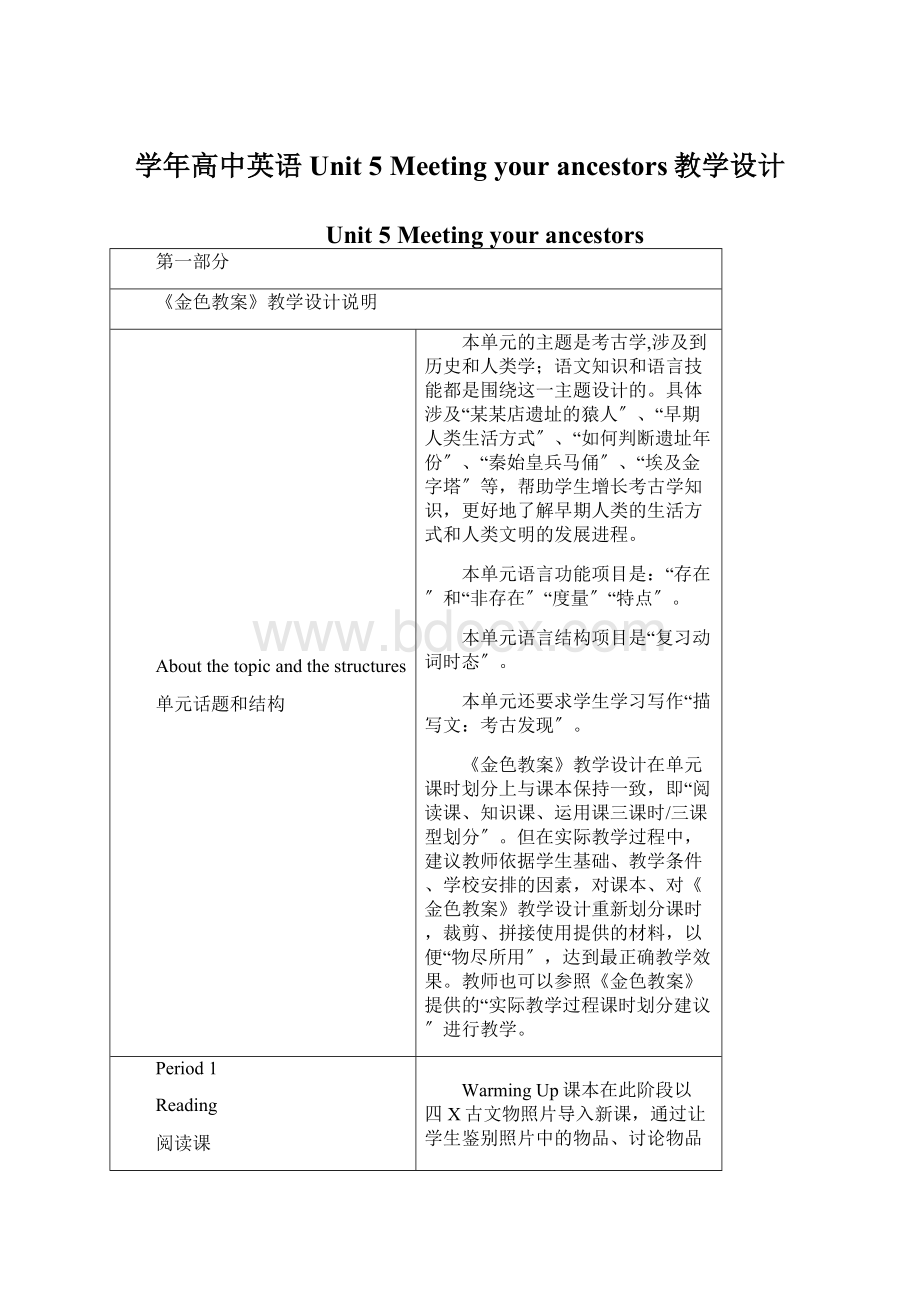学年高中英语 Unit 5Meeting your ancestors教学设计.docx
《学年高中英语 Unit 5Meeting your ancestors教学设计.docx》由会员分享,可在线阅读,更多相关《学年高中英语 Unit 5Meeting your ancestors教学设计.docx(13页珍藏版)》请在冰豆网上搜索。

学年高中英语Unit5Meetingyourancestors教学设计
Unit5Meetingyourancestors
第一部分
《金色教案》教学设计说明
Aboutthetopicandthestructures
单元话题和结构
本单元的主题是考古学,涉及到历史和人类学;语文知识和语言技能都是围绕这一主题设计的。
具体涉及“某某店遗址的猿人〞、“早期人类生活方式〞、“如何判断遗址年份〞、“秦始皇兵马俑〞、“埃及金字塔〞等,帮助学生增长考古学知识,更好地了解早期人类的生活方式和人类文明的发展进程。
本单元语言功能项目是:
“存在〞和“非存在〞“度量〞“特点〞。
本单元语言结构项目是“复习动词时态〞。
本单元还要求学生学习写作“描写文:
考古发现〞。
《金色教案》教学设计在单元课时划分上与课本保持一致,即“阅读课、知识课、运用课三课时/三课型划分〞。
但在实际教学过程中,建议教师依据学生基础、教学条件、学校安排的因素,对课本、对《金色教案》教学设计重新划分课时,裁剪、拼接使用提供的材料,以便“物尽所用〞,达到最正确教学效果。
教师也可以参照《金色教案》提供的“实际教学过程课时划分建议〞进行教学。
Period1
Reading
阅读课
WarmingUp课本在此阶段以四X古文物照片导入新课,通过让学生鉴别照片中的物品、讨论物品的原材料及其用途,来激发学生了解古物的兴趣。
Pre-reading课本呈现了猿人的头盖骨图片,通过谈论我们今天使用的生活用品及生活方式,猜测几万年前猿人可能使用的生活用品及生活方式,将学生的思维引入“史前人类生活〞,为下文阅读做好铺垫。
教师也可以采用本书的Pre-readbygettingtoknowwhatarchaeologyorarcheologyis进行预读/读前教学。
Reading阅读课可以从介绍阅读技巧入手,重点引导学生使用正确的阅读方法,并适当地讲解语言难点,然后进行及时的相关阅读训练。
训练可限定时间,以集中学生注意力,培养学生的阅读意识。
另外,在阅读训练时,应鼓励学生充分利用他们在阅读汉语时的经验,以帮助学生培养良好的英语阅读技能和习惯,不断提高阅读能力。
建议教师采用如下设计进行阅读教学:
readingforformsoflanguage,copyingandmakingsentences,transforminginformation,readingthetextagainforthetypeofwritingandsummaryofAVISITTOZHOUKOUDIANCAVES,writingapassageoftheirown,closingdownbyreadingmoreaboutZhoukoudian.
Period2
Learningaboutlanguage
知识课
Learningaboutlanguage主要突出本单元的重点词汇和主要语法项目。
通过warmingupbyrevisingtheverbtenses,readingaloudtotherecording,discoveringusefulwordsandexpressions,readingmoreaboutDavidsonBlack,revisingthepresentperfectcontinuoustense,discoveringusefulstructuresandclosingdownbylookingandsaying等活动,帮助学生掌握theverbtenses,的各种语用功能。
Period3
Usinglanguage
运用课
UsingLanguage部分包括“听与说〞、“读与说〞和“说与写〞三个部分。
听力课文介绍了考古学家判断遗址年份的两种方法;阅读课文描述了早期人类生活的一个侧面,包括人与人的关系、男女分工的不同、家庭之间的聚会等;“说与写〞部分提供了从三星堆发掘的古文物照片,让学生来描述,使学生进一步认识早期人类的生活方式,拓展考古知识。
教师通过warmingupbygettingtoknowwheremyancestorlived,readingforforms,copyingusefulexpressionsandmakingsentences,readingmoreaboutmanof18,000BC,speakingandwritingaboutSanxingdui,writingastheydo,writinganadfortheSanxingduisite完成本节教学。
实际教学过程课时划分建议
Period1
将WarmingUp、Pre-reading、Reading和prehending整合在一起上一节“阅读课〞。
Period2
将Learningaboutlanguage和Workbook中的USINGWORDSANDEXPRESSIONS、USINGSTRUCTURES整合在一起上一节“语言知识课〞。
Period3
将Usinglanguage设计为一节包括听说读写单项技能或组合技能训练的“综合技能课〔一〕〞。
Period4
将Workbook的READINGANDLISTENING和TALKING整合在一起上一节“听说课〞。
Period5
将Workbook的LISTENINGTASK、READINGANDWRITINGTASK和SPEAKINGTASK整合为一节“综合技能课〔二〕〞。
第二部分
教学资源说明
Section1
Background
背景
围绕单元话题“Festivalaroundtheworld〞,《金色教案》提供了几那么语言规X、短小精干的趣味性材料。
这些材料既可以作为教师教学参考材料为教师所用,也可以直接或改写、重组后作为课堂内外的拓展性阅读材料呈现给学生。
Section2
Explanation
解析
重点针对“阅读课型〞中的课文难句,《金色教案》不仅提供了详尽的,就句论句的解析和翻译,而且还以解析的焦点话题为线索,进行了一定的归纳、辨析和总结,以帮助教师更好地实施“语言形式〞的教学。
Section3
Vocabulary
词汇
按照课本单元词汇表顺序,《金色教案》重点提供动词、短语搭配的讲解。
所提供的例句,经典、地道、实用、易懂,完全可以直接用于教学。
第三部分
教学测评说明
围绕单元词法、句法项目,《金色教案》提供了长短不一的“单元教学测评〞,并备有参考答案供教师使用。
有些测评题目直接源于历年高考试卷,更具有说服力和实用性。
Part1TeachingDesign
第一部分教学设计
Period1Asamplelessonplanforreading
(AVISITTOTHEZHOUKOUDIANCAVES)
Introduction
Inthisperiod,afterthewarmingup,studentswillfirstbeguidedtopre-readbygettingtoknowwhatarchaeologyorarcheologyis.Thentheyshallbereadingforformsoflanguage,copyingandmakingsentences,transforminginformation.StudentswillbereadingthetextagainforthetypeofwritingandsummaryofAVISITTOZHOUKOUDIANCAVES.Theywillbeaskedtowriteapassageoftheirown.TheperiodwillendbystudentsreadingmoreaboutZhoukoudian.
Objectives
Tohelpstudentsunderstandthetext’sformsandcontentsandlearnaboutancestors
Tohelpstudentsmunicateonthetopicinfocuswiththewords,expressionsandstructureslearnedinthisunit
Focus
Words
identify,excavate,interrupt,assume,sharpen,scrape,preserve,applaud,accelerate,arrest
Collocations
regardlessof,cutup,lookahead
Patterns
1.Itisagreatpleasuretomeetyou,studentsfromEngland,whoareinterestedinarchaeology.
2.Youmustbeawarethatit’sherethatwe’refoundevidenceofsomeoftheearliestpeoplewholivedinthispartoftheworld.
3.Wehavebeenexcavatinghereformanyyearsand…
4.Myhandsaredirty.Ihavebeenpaintingthewall.
5.Itmusthavebeenveryunfortable.
6.Doyoumeantosaytheymadetheirownclothes?
Aids
Multimediafacilities,tape-recorder,photos,diagrams
Procedures
1.Warmingupbytalkingaboutancestors
Anancestorisaparentor(recursively)theparentofanancestor.Sothisincludesafatherormother,aswellasgrandparents,great-grandparents,andsoon,althoughthecorrectfemaleformofthewordis"ancestrix",pl:
"ancestrixes"or"ancestrices".
Twoindividualshaveageneticrelationshipifoneistheancestoroftheotheroriftheyshareamonancestor;inacurioususeoflanguageinevolutionarytheory,thisiscalledmondescent.(Strictlyspeakingthismaynotbetrueforsomebacteriaandsimilarorganismswhicharecapableofdirecthorizontalgenetransfer.)
Somesocietieshavehadaformofancestorworship;mostmodernsocietiesseemtohavefocusedthisintogenealogy.
2.Pre-readingbygettingtoknowwhatarchaeologyorarcheologyis
Archaeologyorarcheologyisthestudyofhumanculturesthroughtherecovery,documentationandanalysisofmaterialremainsandenvironmentaldata,includingarchitecture,artifacts,biofacts,humanremains,andlandscapes.
Thegoalsofarchaeologyaretodocumentandexplaintheoriginsanddevelopmentofhumanculture,understandculturehistory,chronicleculturalevolution,andstudyhumanbehaviourandecology,forbothprehistoricandhistoricsocieties.
3.Readingforformsoflanguage
Atyourfirstreadingofthetextitisusuallybestnottostopandconsultyourdictionary.Thiswillinterruptyourprocessofreadingandunderstanding.Oftenthemeaningofunfamiliarwordsandphrasesbeesclearasyoucontinuetoreadthroughthetext.Thedictionarycanbeusedatalaterstage.
Readthetextto:
cut/thesentenceintothoughtgroups,blackenthepredicates,darkentheconnectivesandunderlinealltheusefulexpressions.
4.Findingcollocationsandmakingsentences
Whydowelearncollocations?
•Yourlanguagewillbemorenaturalandmoreeasilyunderstood.
•Youwillhavealternativeandricherwaysofexpressingyourself.
•Itiseasierforourbrainstorememberanduselanguageinchunksorblocksratherthanassinglewords.
Nowreadthetextandfindthecollocations.
CollocationsfromAVISITTOTHEZHOUKOUDIANCAVES
eto…foravisit来……参观,show…around带领……参观,agreatpleasuretodo…非常乐意做……,beinterestedin…对……感兴趣,findevidenceof…找到……的证据,inthecaveshigherupthehill在高山上的洞穴里,regardlessofthecold不顾寒冷,keepwarm保暖,inthecenterof…在……的中心,constructfires生火,cookthefood做饭,scarewildanimalsaway吓跑野兽,excavatelayersof…挖掘一层层的……,keepthefireburning让火一直着着,allwinter整个冬季,atthecavemouth在洞口,tokeepoutthecold御寒,tell…about…告诉……关于……,showpicturesof…,展示……的照片,maketheholefor…挖一个……的洞,makeone’sownclothes做自己的衣服,wearclothesmadeentirelyof…穿着完全由……制成的衣服,usesharpenedstonetools使用尖利的石器,cutup…切碎,clean…from…把……从……去掉,rubanampleamountof…insidetheskin擦上大量的……在兽皮里,make…softenough使……足够柔软,aprimitivenecklace一条原始的项链,careabout…在意……,fromtheseaside从海边,lookverylike…看起来非常像……,partofalargeshallowlake一个很大的浅水湖的一部分,milesfromthesea,离海几英里远,travelto…去……旅行,onthejourneys在旅途中,followtheherdsofanimals跟着兽群,growowncrops种植谷物,pickfruit摘野果
5.Transforminginformation
Wherewastheevidenceofsomeoftheearliestpeoplewholivedinthispartoftheworldfound?
Howcouldtheylivehere?
It'sherethatwe’vefoundevidenceofsomeoftheearliestpeoplewholivedinthispartoftheworld.
Itisreasonabletoassumetheylivedinthesecaves,regardlessofthecold.
Howdidtheykeepwarm?
Fireplacesinthecentreofthecaveshavekeptthemwarn,cookedthefoodandscaredwildanimalsawayaswell.
Whatwildanimalswerethereallthattimeago?
Tigersandbearswerethemostdangerousenemies.
Dotheyrepairthings?
Yes,theydo.
Wheredidtheygetthematerialformakingtheirclothes?
Theydidindeedwearclothesmadefromanimalskins.
Didearlypeoplereallycareabouttheirappearancelikewedo?
Yestheydo.
6.ReadingthetextforthetypeofwritingandsummaryofAVISITTOZHOUKOUDIANCAVES
Determiningthetypeofwritingwillhelpyoudeterminetheauthor’stopic(subject),purpose(whyheiswriting),style(howheshouldwrite)andtone(hisattitudetowardhissubject-supportive,condeming,objective,etc.)
Itisimportanttofindmainideaswhenreading.Mainideashelpyourememberimportantinformation.Themainideaofaparagraphtellsthetopicoftheparagraph.Thetopictellswhatallormostofthesentencesareabout.Theothersentencesintheparagrapharecalleddetails.Detailsdescribeorexplainthemainidea.Readthetexttofindthemainidea.
ADIALOGUEENTITLED:
AVISITTOTHEZHOUKOUDIANCAVES
MAINIDEASOFTHEDIALOGUE:
AgroupofstudentsfromEnglandhasetotheZhoukoudianCavesforavisit.Anarchaeologistisshowingthemaround.
DETAILEDINFORMATIONOFTHEDIALOGUE:
●It'sherethatwe’vefoundevidenceofsomeoftheearliestpeoplewholivedinthispartoftheworld.Wehavefoundhumanandanimalbonesinthosecaveshigherupthehillaswellastoolsandornaments.
●Wehavediscoveredfireplacesinthecentreofthecaveswheretheyconstructedfires.
Wehavebeenexcavatinglayersofashalmostsixmetresthick,whichsuggeststhattheymighthavekeptthefireburningallwinter.
●Wehavebeenfindingthebonesoftigersandbearsinthecavesandwethinktheseweretheirmostdange